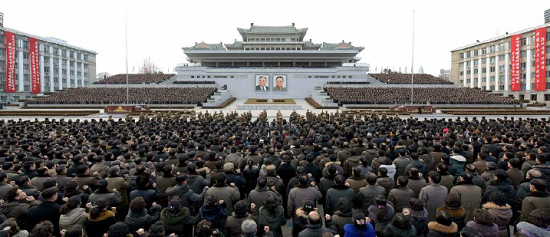The North Korean authorities have issued instructions to the population to engage in self-reproach, emphasizing the fact that Kim Jong Un made ‘remorseful’ remarks during his New Year’s Address. January has been designated as a month for compulsory daily education, with everyone from ordinary citizens to Party cadre required to attend sessions and have their attendance checked off.
“Recently, the Central Committee handed down instructions for education based on the New Year’s address with the slogan of ‘Let the whole country be enthusiastic in learning the New Year’s address.’ Accordingly, January has been appointed as a ‘focused period for learning the address,’ and residents are being forced to study the transcript for extended periods of time,” a source in North Hamgyong Province told Daily NK on January 11.
“In response to Kim Jong Un’s remarks during his speech that he has ‘spent the year with regrets and sadness,’ residents have been ordered to engage in their own self-criticism, with remarks like, ‘I have done wrong to the Marshal (Kim Jong Un) and I am the one who should repent,’ unlike previous years in which only attendance at the lectures was sufficient.”
North Korean residents normally study the New Year’s address with their affiliated societal organization, and the regime emphasizes the principle of memorizing and digesting its meaning along with a thorough parsing of a special booklet released by the Central Party with a review of the address.
The increased demands this year and the focus on self-criticism – though a fixture in North Korea not typically connected directly to the New Year’s Address – is a departure from the norm.
“Residents not only have to memorize the original text of the New Year’s address, but also must study the education book and attend lectures and discussions along with self-criticisms. During the debate sessions, people are forced to disclose everything they have done during the last year and criticize themselves, creating an atmosphere of ‘ideological struggle’ every day,” the source explained.
“Ordinary citizens and students are also compelled to berate themselves for not following the Party instructions and saddening the Marshal, before making new resolutions.”
Naturally, this is not without complaints, with people waiting to get behind closed doors to vent about how, “even the thought of the New Year’s address makes [them] sick,” a source in North Pyongan Province added.
Cadres are subjected to similar experiences, but scaled up to their level of authority, he said, noting that they are compelled to take the blame for things like flood damage due to “failure to properly carry out the Marshal’s (Kim Jong Un) instructions.”
Meanwhile, North Korea’s media apparatus has been heavily promoting Kim Jong Un’s remorseful remarks in his New Year’s address as part of a ‘people-first policy.’ The state-run publication Rodong Sinmun reported on January 10 that “Kim Jong Un has visited every rough road, mountain, and the dangerous front line from the start of the new year, simply out of caring for the people.”
In response to this, Jeon Hyun Joon, Director of the Northeast Asia Peace and Cooperation Institute commented, “The regime is trying to portray Kim Jong Un as sympathizing with people’s hardships through the emphasis on so-called ‘benevolent politics’ and ‘love for the people.’ It can be viewed as an acknowledgement that the country is undergoing a difficult time, asking the residents to share the burden for a better future.”
“Kim Jong Un seems to have realized that it is not easy to escape from poverty while maintaining the current political system, therefore, he is attempting to maintain political stability with propaganda slogans like ‘Let’s endure together’ and Let’s go together.’ Similar efforts were made during Kim Jong Il’s reign, when official slogans like ‘Let’s go laughing together to overcome the hardships’ were frequently used.
Some argue that the intense self-criticism sessions are designed to deflect blame back to the residents, as increasing levels of negative sentiment toward Kim Jong Un have become apparent.
“Kim Jong Un has blamed himself for a lack of ability in his New Year’s address, but it is likely that his true intention was to transfer the responsibility for economic failure to the executives and people, rather than himself. He must be trying to counter resentment by compelling citizens to blame themselves for the reality of North Korea,” one expert on North Korean affairs (who declined to be named) told Daily NK.





















